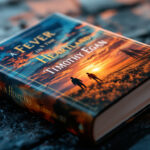Best Books About Puberty to Help Kids and Teens Through Big Changes
Puberty can be a confusing time, but the right book can make it less overwhelming. Books offer a safe, approachable way to understand the changes that come with growing up. Whether it’s about emotions, body changes, or self-confidence, a good read can guide kids and teens through this stage with clarity and support. Knowing where to start can be tough, but we’ve got you covered.
Why Reading About Puberty Matters
Puberty can feel like a rollercoaster, full of confusing moments and unanswered questions. For kids and teens, reading books about puberty offers more than just basic knowledge. It’s an easy, non-judgmental way to understand their changing bodies, emotions, and identities during this important stage of life.
Understanding Your Body
Puberty brings a lot of physical changes — it’s not always easy to keep up. Books can break down these changes clearly and reassuringly, so kids know what to expect.
- Growth spurts: Why do your pants suddenly feel too short? Books explain growth in simple terms.
- Voice changes: They talk about how and why voices crack, deepen, or shift during adolescence.
- Body hair and acne: Understanding these normal changes helps kids feel less isolated.
A well-written book answers the questions kids may feel too shy to ask. It can also debunk myths, making the process feel less overwhelming.
Navigating Emotions
Puberty doesn’t only affect the body — it shakes up emotions too. Books about puberty explore the ups and downs teens face during this time.
- Mood swings: Hormones can send emotions all over the place. Reading helps explain why.
- Friendships and relationships: Many books touch on building and maintaining healthy connections.
- Stress management and anxiety: They may even offer tips for staying calm during emotional storms.
By reading, kids gain tools to understand their feelings and feel less alone. It’s like having a road map for the emotional twists and turns of growing up.
Building Confidence and Self-Awareness
When kids know what’s happening, they feel more in control. Books about puberty encourage self-acceptance and boost confidence.
- Positive self-image: Learning that everyone grows at their own pace helps kids feel less self-conscious.
- Empowerment through knowledge: When they understand their bodies, they’re more likely to trust themselves.
- Growth of self-awareness: Books often encourage reflection, helping kids understand who they’re becoming.
The right book can be like a mirror, showing kids they’re not alone in their experiences. It gives them the tools to feel good about themselves, despite all the changes happening inside and out.
Top Recommended Books About Puberty
Finding the right book about puberty can make all the difference in how kids and teens process this pivotal stage. There’s no one-size-fits-all resource, which is why books tailored to specific needs are key. Below are some great options for girls, boys, and gender-inclusive reads.
Good Books About Puberty for Girls
Girls face unique challenges during puberty, like understanding their menstrual cycle, dealing with societal pressures, and building self-esteem. The following books can help:
- The Care and Keeping of You” by Cara Natterson This bestseller from the American Girl series is well-loved for a reason. It’s informative but approachable, covering everything from hygiene to emotions. Girls find its inclusive tone comforting, especially during moments of uncertainty.
- Just for Girls: A Book About Growing Up by Sarah Delmege Perfect for preteens, this book answers common questions in a friendly, straightforward style. It covers physical and emotional changes, ensuring readers don’t feel overwhelmed or alone.
- Celebrate Your Body (and Its Changes, Too!) by Sonya Renee Taylor This empowering book dives deeper into body positivity, helping girls embrace their unique selves. It’s an excellent resource for promoting self-confidence and kindness.
These books bridge the gap between curiosity and understanding, making puberty less intimidating for girls.
Good Books About Puberty for Boys
Puberty is equally daunting for boys, who may deal with voice changes, growth spurts, and rapidly shifting emotions. The following books could be game-changers:
- Guy Stuff: The Body Book for Boys by Cara Natterson Tailored for boys, this guide simplifies the “weird stuff” boys experience during puberty. From acne to emotions, it’s a relatable roadmap for navigating these changes.
- What’s Happening to Me? (For Boys) by Alex Frith This classic remains a go-to for preteen boys. Written in an engaging Q&A format, it tackles physical changes with humor and clarity.
These picks combine science-backed info with humor and relatability, making tough topics easier to digest for boys.
Gender-Inclusive Books
Not everyone feels represented by books labeled for girls or boys. Luckily, there are incredible gender-neutral options that celebrate diversity and inclusivity:
- Puberty Is Gross but Also Really Awesome by Gina Loveless With a playful tone, this book isn’t afraid to get real about growing up — for everyone. It uses inclusive language and illustrations to ensure that all readers feel seen.
- You-ology: A Puberty Guide for EVERY Body by the American Academy of Pediatrics This groundbreaking book focuses on inclusivity, catering to all genders and identities. Co-written by pediatricians, it offers medically accurate yet friendly advice.
Gender-inclusive books are built for today’s world, ensuring everyone feels informed and embraced during puberty.
Selecting the right resource matters. Look for books that resonate with your child’s experiences or help broaden their understanding of others. Reading helps not just with learning but also with feeling seen and confident.
How to Choose the Right Book for Your Child
Selecting the right book for your child, especially on a sensitive topic like puberty, requires some thought. It’s not just about finding a book with good reviews—it’s about choosing one that meets their needs and resonates with them. Here are some key factors to consider when choosing the perfect book.
Consider Age-Appropriateness
Age-appropriateness is crucial when choosing a book. Kids at different developmental stages process information in unique ways. Imagine giving a toddler a calculus book—it wouldn’t make sense, right? The same principle applies here. A book meant for teens could include concepts or details that are too advanced for a younger child.
- For younger kids: Look for books with simple explanations and illustrations. These make it easier to understand complex topics without overwhelming them.
- For preteens: Choose books that balance information with humor or relatable stories, helping them connect to the content.
- For teens: Opt for more detailed books that address not just the “what” but also the “why” behind changes, as they’re often ready for deeper discussions.
Matching the book’s content to your child’s maturity ensures they’ll actually benefit from the information without feeling intimidated or bored.
Look at the Book’s Tone
Books, like people, have personalities. The tone of a book can make or break its effectiveness for your child. Kids who love jokes might shut down if a book feels too serious, while others may prefer straightforward facts.
- Funny and lighthearted books can make the conversation around puberty less awkward and more approachable.
- Serious and factual tones work better for kids who prefer science-backed information without fluff.
- Conversational tones act like a friendly chat, making the book relatable while still informative.
The tone is just as important as the content. When the tone matches your child’s personality, they’re more likely to keep reading—and learning.
Seek Recommendations from Trusted Sources
Not sure where to start? Trusted sources can be your best allies. Teachers, librarians, or even pediatricians often have lists of vetted books tailored to different age groups and topics. They’ve seen what works and can often recommend hidden gems.
Online reviews can also help. Look for feedback from other parents who’ve been in the same situation. Reliable platforms like Goodreads or parenting blogs often include ratings and descriptions to guide your choice.
By combining insights from professionals and feedback from other families, you’re more likely to find a book that checks all the right boxes.
Selecting a book might seem like a small step, but it has the potential to make a big difference in how your child navigates this challenging stage. Focus on their unique needs, and you’ll find a resource they’ll actually use—and maybe even enjoy.
Tips for Introducing Puberty Books to Your Child
Introducing puberty books to your child can feel like a delicate task, but it doesn’t have to be awkward. Preparing the right environment and approach allows you to normalize an important topic while ensuring they feel comfortable. Here are three simple strategies to get started.
Create a Comfortable Environment
Your child’s comfort is key when discussing puberty. Choose a relaxed, informal setting where they feel safe to talk. Imagine trying to have such a conversation at a crowded family dinner—it wouldn’t go over well. Instead, pick somewhere private like your living room couch or their bedroom.
- Avoid rushing the conversation. Give it the attention it deserves.
- Schedule a quiet moment, like after dinner or during a car ride, for uninterrupted time.
- Make sure your body language is open. Sit next to them, not across, and maintain eye contact.
By creating a calm environment, you’re showing them this is a normal, approachable topic, not something to shy away from.
Be Open to Questions
Kids are naturally curious, and they’ll likely have questions. The way you answer determines how comfortable they feel coming to you in the future. Keep it straightforward and honest. If they ask something that surprises you, take a deep breath before responding—don’t panic.
- Use simple language when explaining tricky concepts.
- It’s okay to admit when you don’t know the answer. Offer to look it up together.
- Reassure them by clarifying that no question is “weird” or “wrong.”
Questions are a sign they’re processing and eager to learn. Show respect for their curiosity, and they’re more likely to trust you as a resource.
Normalize the Topic
Puberty is a universal experience, yet so many kids feel embarrassed about it. Your attitude has a huge impact on how they’ll view it. Act casual, even if you’re nervous. Treat it like any other subject instead of a taboo one.
- Mention that everyone—parents included—has gone through puberty.
- Use real terms for body parts instead of slang to reinforce normalcy.
- Add some humor if it feels right. Laughter can ease tension and take the edge off uneasy moments.
When you approach it calmly and naturally, your child will feel more at ease. The goal is to set the tone that puberty isn’t embarrassing; it’s simply part of growing up.
Conclusion
Helping kids understand puberty through books is a thoughtful way to boost their confidence and knowledge. These resources break down complex topics in a relatable and easy-to-digest manner, fostering self-awareness and acceptance. Choosing the right book meets them where they are, making the discussion less intimidating and more empowering.
If you haven’t already, consider exploring these must-reads mentioned earlier in the post. Whether for your child or a loved one, a well-chosen book can make all the difference in navigating life’s big changes.







